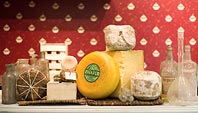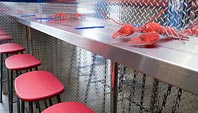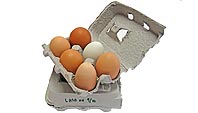
Openings
Bedford Cheese Shop
229 Bedford Ave., at N. 4th St., Williamsburg, Brooklyn; 718-599-7588
In its move from the recesses of Williamsburg’s mini-mall to the corner location recently vacated by Clovis Press bookstore, Bedford Cheese Shop is gaining street access, two picture windows, and slightly larger premises—the better to display its exquisitely pungent wares. Meticulously kept, freely sampled, and wittily described on price placards, cheese is only part of the shop’s success. There’s also the expertly curated collection of local-food finds, from Sag Harbor sea salts and New York State maple syrup to Pastosa pasta and mozzarella made in a neighborhood garage. New to this location are a cheese plate of the day and a sandwich of the day, like Paul Bertolli’s Fra’ Mani soppressata with paprika-rubbed Ossau-Iraty and shallot-endive confit.
Urban Lobster
240 E. Houston St., at Ave. A; 212-677-2626
Susan Austin describes herself as a 30-minute chef and a lifelong foodie who’s worked in importing, manufacturing, marketing, and fashion. This week, she chucks all that to follow her culinary bliss at Urban Lobster, the twelve-seat East Village clam shack she’s opening with her husband, Rony Brovda. Their menu, which Austin intends to sell mostly for takeout and delivery (via a tricked-out Scion xB), covers such familiar turf—make that surf—as chowders and bisques, lobster bakes, and peel-and-eat shrimp. You might expect an old salt to be at the helm of such a staunchly traditional operation, but only the seafood comes from Maine and Canada. Austin’s from the Five Towns.

AND… Into the prepared-foods and gourmet-goods void left by the demise of Cobble Hill’s Tuller Premium Food comes its replacement, Cobblestone Foods, where the emphasis is more on prepared and less on gourmet, at least in the $15-jar-of-jam sense of the word. Chef-owner Jeremy Wachalter used to shop at Tuller and cook at the Modern, but here, he’ll stick to rustic fare like rotisserie chicken, lamb gyros, and a litany of Thanksgiving-worthy sides. He’s streamlined Tuller’s legendary cheese selection and added a line of cheese garnishes like port-poached Seckel pear, onion chutney with honey and sherry, and preserved kumquats. Locals will also find Gorilla coffee, Doughnut Plant doughnuts, and fresh baby food for gourmets in training (199 Court St., nr. Bergen St., Cobble Hill, Brooklyn; 718-222-1661). r.r. & r.p.

{DECODED}
Good Eggs
What with the crowds, the moody, monosyllabic checkout clerks, and the spinach paranoia, supermarket shopping can be a real chore. Even more difficult than outmaneuvering an aggressive octogenarian cart-pusher, though, is deciphering the typical expiration code you may find stamped on a carton of eggs. USDA-graded eggs, you see, must carry a Julian date based on the calendar (001 is January 1, 365 is December 31 except during a leap year, and Monday, October 9, in case you were wondering, is day 282—good to know if you left your abacus in your other suit). The Julian date indicates when the eggs were packed. You may also find a less cryptic “best by” date (not required by the USDA) on your carton of eggs, but the thing of it is, this date can exceed the Julian date by 30 days. (You can safely eat an egg that’s five weeks old, but the fresher they are, of course, the better they taste.)
Enter Flying Pigs Farm in collaboration with Blue Ribbon Bakery Market with a delightfully low-tech solution: Whenever Flying Pigs’ farmers Jennifer Small and Michael Yezzi collect their eggs, which come from pasture-raised Rhode Island Red chickens, they simply whip out a green Sharpie and write “laid on” followed by a date on each carton. Then once a week, they haul them over to Blue Ribbon Bakery Market, where they go for $7 a dozen. Pricey, yes, but if you wanted a fresher egg, you’d have to raise your own chickens. (14 Bedford St., nr. Downing St.; 212-647-0408)